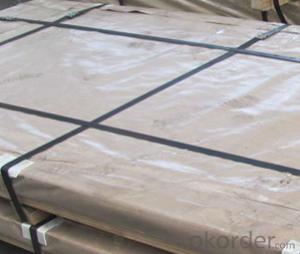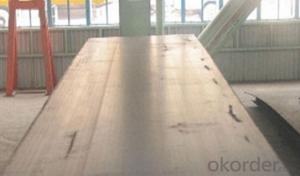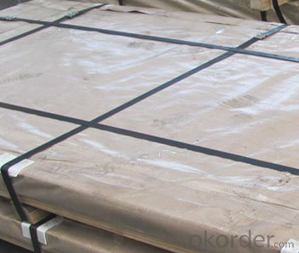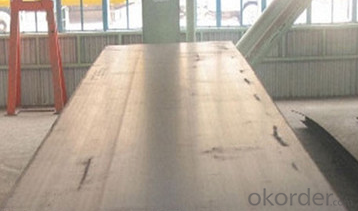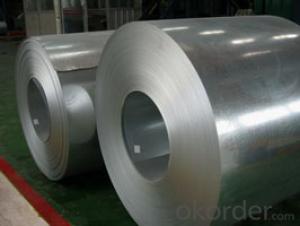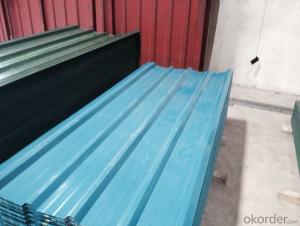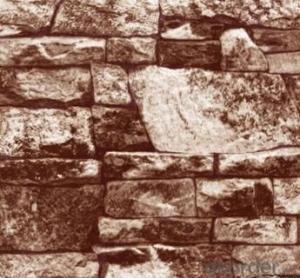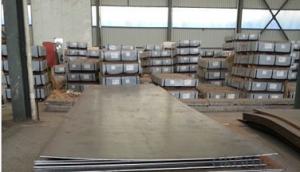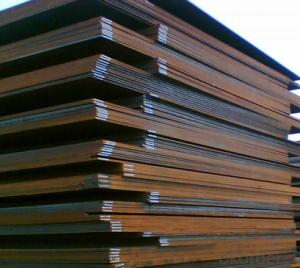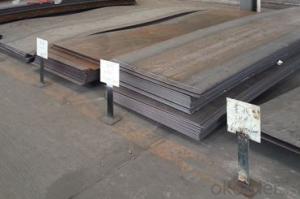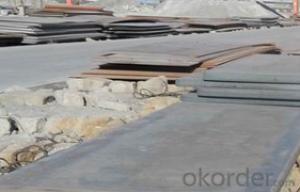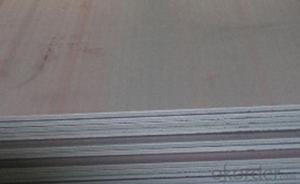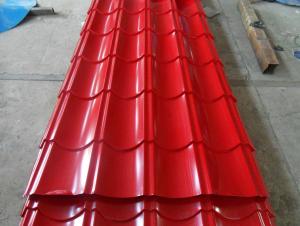Hot Rolled Carbon Steel Sheet A709 CNBM
- Loading Port:
- Qingdao
- Payment Terms:
- TT OR LC
- Min Order Qty:
- 10 pc
- Supply Capability:
- 30 pc/month
OKorder Service Pledge
Quality Product, Order Online Tracking, Timely Delivery
OKorder Financial Service
Credit Rating, Credit Services, Credit Purchasing
You Might Also Like
Quick Details
| Standard: | AISI, ASTM, DIN, GB, JIS | Grade: | A572,A573,A633,A678,A709,A710,G3101,G3136,etc | Thickness: | 1mm-200mm |
| Brand Name: | SHOU GANG GROUP, AN STEEL | Model Number: | Q235 | ||
| Type: | Steel Plate | Technique: | Hot Rolled | Surface Treatment: | Coated |
| Application: | widely | Special Use: | High-strength Steel Plate | Width: | 1000mm-3000mm |
| Length: | 1000mm-12000mm | Price Term: | FOB CIF CFR |
Packaging & Delivery
| Packaging Details: | standard seaworthy export packing or as the request of customers |
| Delivery Detail: | 10 days after deposit or according to customers' quantity |
Specifications
hot rolled carbon steel sheet
1.Thickness:1mm-200mm
2.Length:1000mm-12000mm
3.Width:1000mm-2000mm
hot rolled carbon steel sheet
| Product | HR steel plate prices carbon steel plate prices per kg |
| MOQ | 25 ton |
| Thickness | 1mm-200mm |
| Width | 1000mm-3000mm |
| Length | 1000mm-12000mm |
| Application | widely |
| Standard | AISI,ASTM,BS,DIN,JIS,GB,etc |
| Grade | A572,A573,A633,A678,A709,A710,G3101,G3136,etc |
| Tpye | Steel plate |
| Surfacing | Coated |
| Productive Technology | Hot Rolled & Cold Rolled |
| Port | |
| Payment Terms | L/C,T/T,Western Union,MoneyGram |
| Product Ability | 5000 tons per month |
| Delivery | 10 days after deposit or according to customers' quantity |
| Packing | standard seaworthy export packing or as the request of customers |
- Q: What is the minimum thickness of steel sheets?
- The minimum thickness of steel sheets can vary depending on the specific application and industry standards. However, typically, steel sheets are available in thicknesses ranging from 0.4mm to 6mm.
- Q: What is the process of polishing steel sheets?
- The process of polishing steel sheets involves several steps to achieve a smooth and shiny finish. First, the steel sheets are cleaned to remove any dirt, oil, or debris that may be present on the surface. This is typically done using a degreaser or a solvent. Next, the sheets are sanded using abrasive materials, such as sandpaper or a sanding belt. This step helps to remove any visible scratches or imperfections on the surface of the steel. After sanding, the sheets are typically polished using a polishing compound or paste. This compound is applied to the surface and rubbed in with a cloth or a buffing wheel. The polishing compound helps to remove any remaining scratches and brings out the natural shine of the steel. Once the initial polishing is complete, a finer polishing compound may be used to further enhance the shine and smoothness of the steel sheets. This step is repeated until the desired level of polish is achieved. Finally, the sheets are thoroughly cleaned and inspected to ensure that they meet the desired quality standards. This may involve removing any remaining polishing compound residue and checking for any remaining imperfections. Overall, the process of polishing steel sheets requires careful cleaning, sanding, and polishing to achieve a smooth and shiny finish. The specific techniques and materials used may vary depending on the desired level of polish and the type of steel being polished.
- Q: Can steel sheets be used in electrical applications?
- Yes, steel sheets can be used in electrical applications. They are commonly used as magnetic cores in transformers and other electrical machines. Additionally, steel sheets are often used as a protective casing or enclosure for electrical equipment.
- Q: What is the average lead time for ordering steel sheets?
- The average lead time for ordering steel sheets varies depending on the supplier and the specific circumstances, but it typically ranges from 1 to 4 weeks.
- Q: Can steel sheets be used for elevator cabins?
- Indeed, elevator cabins can certainly utilize steel sheets. Owing to its robustness, resilience, and fire-resistant attributes, steel is widely preferred as a material for constructing elevator cabins. By crafting steel sheets, one can achieve an elegant and contemporary appearance for these cabins, while also effortlessly tailoring them to meet specific design prerequisites. Furthermore, steel proves to be a cost-effective alternative for elevator cabins due to its easy accessibility and prolonged lifespan.
- Q: Can steel sheets be used for acoustic insulation?
- Acoustic insulation can be achieved to some extent with steel sheets, but their effectiveness falls short compared to materials specifically designed for this purpose. The density and mass of steel sheets naturally possess sound-blocking properties that can aid in reducing the transmission of sound waves. Nevertheless, materials such as mineral wool, fiberglass, or acoustic foam, which are engineered to absorb and dampen sound, outperform steel sheets in this regard. Although steel sheets can provide a certain degree of noise reduction, they are primarily utilized for structural purposes in buildings rather than serving as the primary acoustic insulation material. For optimal acoustic insulation, it is advisable to employ materials that have undergone specific design and testing for noise reduction, as they will offer superior performance in absorbing and blocking sound waves.
- Q: Can steel sheets be galvanized?
- Yes, steel sheets can be galvanized. Galvanizing is a process of applying a protective zinc coating to steel to prevent corrosion, and it can be done on steel sheets as well.
- Q: What is a steel sheet?
- A steel sheet is a flat and thin piece of metal made from steel, commonly used in construction, manufacturing, and various industrial applications.
- Q: How do steel sheets handle water resistance?
- Due to their inherent properties and protective coatings, steel sheets generally possess excellent water resistance. Steel, being a non-porous material, does not readily allow water to penetrate. The smooth surface of steel sheets effectively prevents water seepage. Moreover, steel sheets are commonly coated with protective layers like galvanized zinc or paint, further enhancing their water resistance. Galvanized steel sheets are furnished with a zinc layer that acts as a moisture barrier and safeguards against corrosion. Zinc displays high resistance to water, and even if the coating sustains scratches, the sacrificial zinc layer shields the underlying steel from rusting. Consequently, galvanized steel sheets exhibit remarkable durability and water resistance, even under extreme conditions. Painted steel sheets represent another prevalent alternative. The paint serves as a safeguarding layer that obstructs direct contact between water and the steel surface. By forming a barrier, the paint effectively prevents moisture from infiltrating the steel and causing corrosion. Nevertheless, it is crucial to acknowledge that the quality and thickness of the paint coating significantly influence the water resistance of painted steel sheets. To summarize, steel sheets possess commendable water resistance due to their non-porous nature and the presence of protective coatings. Whether it is galvanized steel sheets with a zinc coating or painted steel sheets with a protective layer of paint, both choices offer reliable water resistance and prove suitable for diverse applications where exposure to water is a concern.
- Q: What is the average cost of steel sheets compared to fiberglass?
- The average cost of steel sheets can vary compared to fiberglass sheets depending on a variety of factors. In general, fiberglass sheets tend to be less expensive than steel sheets. This is primarily because the raw materials used in steel sheet production are more costly, and the manufacturing process is more complex. Furthermore, steel sheets are renowned for their durability and strength, making them a popular choice for applications that require resilience and resistance to harsh weather conditions or impact. Conversely, fiberglass sheets are typically cheaper due to the lower cost of raw materials and the simpler manufacturing process involved. They are commonly employed in applications where weight and corrosion resistance are crucial factors, such as the construction of boats or aircraft. Nevertheless, it is important to acknowledge that market fluctuations, availability, and specific project requirements can also influence the cost comparison between steel and fiberglass sheets. Hence, it is advisable to obtain quotes from suppliers and compare prices to accurately determine the average cost within a given context.
Send your message to us
Hot Rolled Carbon Steel Sheet A709 CNBM
- Loading Port:
- Qingdao
- Payment Terms:
- TT OR LC
- Min Order Qty:
- 10 pc
- Supply Capability:
- 30 pc/month
OKorder Service Pledge
Quality Product, Order Online Tracking, Timely Delivery
OKorder Financial Service
Credit Rating, Credit Services, Credit Purchasing
Similar products
Hot products
Hot Searches
Related keywords
